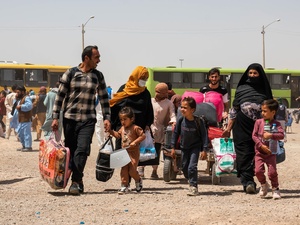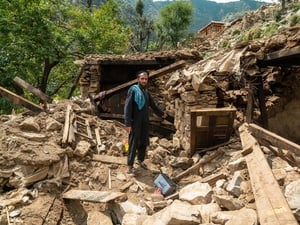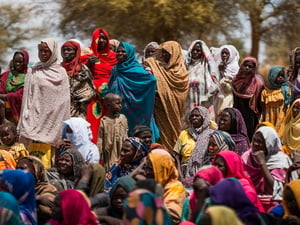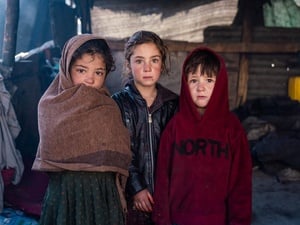Uprooted Afghans return home in and around Kabul
Uprooted Afghans return home in and around Kabul

Afghan refugees moving to a new site inside Pakistan.
KABUL, Nov. 28 (UNHCR) - Afghan civilians, uprooted by years of civil war, are continuing to return to their homes in and around the capital of Kabul. In neighbouring Iran, the highest number of voluntary daily returns to Afghanistan was also recorded Wednesday, but UNHCR officials said they had received reports an unknown number of Afghans had been forcibly deported.
In Pakistan, the transfer of Afghan refugees to sites better able to offer them assistance was continuing.
The U.N. refugee agency launched a $182 million Plan of Action, formally unveiled Tuesday, to help these and another nearly 900,000 people both inside and outside the country through the middle of next year.
Reflecting the relatively stable conditions around the capital, as many as 3,000 persons had returned to Kabul since Friday. They included civilians who left the capital for surrounding areas and another 260 who earlier had crossed into Pakistan's North-West Frontier Province as refugees, but decided to return after the fall of the Taliban in Kabul.
Inside the city, UNHCR Wednesday began a four-day programme to distribute blankets, sweaters, plastic sheeting, kitchen sets, cooking and heating stoves and charcoal to more than 10,000 vulnerable persons, including some families who had lost their homes during the recent air strikes. Together with a local non-governmental organization, Pamir Development Agency, it began a house-to-house survey to identify additional people in need of assistance.
While some civilians returned to the capital, others left Kabul to return to the Shomali Plains north of the city. An estimated 200,000 people had fled their homes in that region during the war, half of them making their way to Kabul. UNHCR has held a coordination meeting with aid agencies on how best to help the Shomali Plains people.
The situation in Iran was mixed. Some 1,535 Afghans aboard 40 buses spontaneously returned home Wednesday, the largest daily return since the start of the year. Many returnees said they were going home despite worries about fuel shortages in the region, especially in view of the forthcoming winter. But UNHCR officials also received reports of new deportations of unknown numbers of Afghans and urged authorities to halt the practice and allow field staff access to deportees.
In Pakistan, UNHCR said it would start transferring as many as 10,000 'invisible' refugees currently living in extremely difficult conditions among the local population in the city of Quetta to the Mohammad Khail camp 85 kilometres to the south-west where they will be given food, tents and other supplies. The site is an old refugee camp which once housed 150,000 Afghans, though only around 7,000 now remain.
At the frontier town of Chaman 2,000 recently arrived Afghans were registered in the last two days prior to being transferred to a permanent site at Roghani. A temporary restriction on the registration of men aged between 20 and 40 because of worries about a possible large influx of fighters from Afghanistan, was lifted Tuesday.
People crossing the border said the situation in the Afghan border town of Spin Boldak was tense with local shops closed and confusion about who was in charge. Several tented encampments in the area hold tens of thousands of people unsure what to do next with road security a continuing problem.
One vehicle belonging to a local NGO working with UNHCR came under fire Tuesday between the cities of Kabul and Jalalabad during which one passenger was wounded in the arm.
The UNHCR Plan of Action was designed to help nearly 900,000 uprooted Afghans through the next few months in several areas: protecting some 500,000 uprooted and other vulnerable Afghans inside the country; assisting 300,000 refugees in Pakistan and 80,000 in Iran who had fled in the last two months; preparing for the possibility of a further exodus; and eventually helping refugees return to their homes.
High Commissioner Ruud Lubbers said: "The rapidly unfolding events in Afghanistan have provided the humanitarian community with new opportunities to help millions of Afghans who have suffered far too much for far too long."









